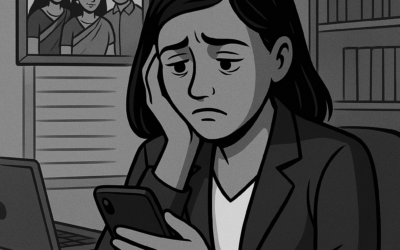*This blog is capturing the stories two of our fellows bring out from their experiences that resonate with the idea of reductive seduction that we discuss widely during the induction training program of the fellowship.
Episode 1: By Utkarsh
Many of us have been in a position where, from our vantage, the problems of other people have seemed rather easy to solve. We can see a simple and easy-to-implement solution for that person’s issue, sometimes to the point where we wonder why someone has not pointed that out or thought of it. But at the same time, if someone were to think of our problems the same way, we would be much more inclined to believe that is not the case.
We would think and explain that our issue is extremely complex and that there are ten different reasons why it would be rather difficult to untangle or solve it. This whole idea of negating or oversimplifying the complexity of other people’s problems (while thinking about why our issues are much more cumbersome) is known as reductive seduction of other people’s problems. A term coined by American author Courtney Martin.
We have all been the culprits of practising and believing the same at one point or another. This process of reductive seduction doesn’t imply malicious intent. Someone might genuinely empathise with a problem but mistakenly believe a simple solution exists. One of the major flaws of this way of thinking is that one tends to overlook, or is unable to see, the unintended consequences of well-intentioned help or care.
So now let me share one of the instances from my life where I fell into this trap of reductive seduction.
The Story Of Anuj

Anuj is a friend—actually, a great friend. We have known each other since the 6th standard. Although he is a couple of years older, I have always felt more connected to him than someone my age. So even at school, when he was a standard senior, we hung out together. He is someone you can rely on. Always up and ready to go.
It is hard for me to remember a time or an instance where I asked him to do something for me or go somewhere with me, and he said no. From attending boring marriage functions to helping me do the chores at home. We chatted about everything under the sun except his family. I knew he had a less supportive family but never pressed him for details for fear of hurting or offending him, and to be honest, I did not care much at the time.
The Problem Emerges
So, it has been a week since the 10th standard (Board’s) examination was over, and since I love to travel, I have already made plans with Anuj to visit a beautiful waterfall not very far from our home. One day, during our usual evening walk, he tells me that in the last couple of months, things have become a bit harder for him in his house. He talked about how his father, who has a drinking problem, has gotten a bit worse lately. He has an elder brother who does not show much concern for his well-being. Mother is there, but she too is often at the receiving end of his father’s anger as is him.
His place of refuge amidst all this chaos is his aunt, who lives in Kolkata. He talked about how she has been the one who has helped him deal with his family situation, and how he has grown much closer to her over time.
The Ill Fated Advice
It took me some time to process what he had just said because I knew things were not alright; but had no idea how serious the situation was or what Anuj had to deal with, daily. We were both quiet for a while after that. He was probably contemplating whether he should have told me about his family. In contrast, without adequately registering all of the information, I was trying to find a solution in my head for him.
Because of course, Anuj would not tell me about his problems until and unless he wanted an answer from me, and as luck would have it, I found a solution for him rather quickly. I suggested to him that he and his mother go to this aunt’s house for some time, away from the violence and fear, and maybe ask her for help. And I was persistent; I kept at it for the next couple of weeks. He had his inhibitions about leaving home and travelling hundreds of kilometres to stay with his aunt.
Dilemma
He was also afraid of the potential repercussions of his actions and was unsure if that was something he even wanted in the first place. But to me, it was clear. The way I had understood his problem was that since his father would never listen to him, his brother was least interested, and his mother, well, she did not have much of an agency either. That is why the best solution would be to run away from that place.
What would that action eventually achieve? See, I did not think that far ahead. The immediate answer to all his problems to me was to leave his home, and then, as things might and will change, we would deal with them later.
In my mind, I had found a convenient solution to his problem. I did not or could not, at that point, think of what the consequence could be. I can’t say for sure what ultimately convinced him, but he did exactly what I had suggested. For the next week or so, things went quite smoothly, but during his time there, the issue must have come up again in their conversation, prompting his aunt to intervene. She tried to speak with the father, but that was resisted on all fronts, as it was extremely hard to convince him of the fact that he had done something wrong. The call ended with the father threatening to come to Kolkata and force Anuj and his mother to return to Ranchi.
The Consequence
Anuj and his mother remained with his aunt for roughly six months. The aunt also had his own family to look after. They had relatives visiting her, which made the situation hard for them because the two of them had been living with them for so long, hence the gossip and questions. Her husband also grew impatient, thinking it was not his or his wife’s problem to solve and that they couldn’t live here indefinitely. So not much later, she had a conversation with Anuj’s mother, explaining it all.
One of the solutions that she presented them with was that Anuj could find a job somewhere close to that place, which could be a mall or a call centre, and then rent a place nearby. But that would also mean for Anuj to drop out of school altogether, which his mother would have never wanted. Left with not much of a choice, she had to call back her husband, where she tried to explain that things couldn’t continue the way they had for so long and something needed to change, and that would be his behaviour, and if not, the only other option would be to seek separation.
In a place like ours, the word separation or divorce is something you don’t ever hear of because of the social stigma attached to it. Especially for women, who are sometimes pressured by their own families not to take the step as it brings dishonour. But it did have an effect: a false promise was made, and they were eventually persuaded to return. Things gradually returned to how they were before; they did not get worse, but neither did they improve.
Self Reflection
I would like to think that he decided to take that step, or even if I suggested that he go with that, he must have already been thinking about that, but it does not take away the fact that I did somewhere play a role in there and which did not lead to anything fruitful at the end.
So, why did my solution fail? Instead of delving deeper into my friend’s problem, which would have made me feel rather uncomfortable, maybe it would have forced me to look around my own family; thus, to avoid that, I chose or found an easy path, a path where if everything works, my friend will be grateful to me, and if it doesn’t, well, things weren’t going so well anyway. Two things happened:;first, instead of addressing the complexities of his dilemma, I attempted to find an easy answer for him, and second, I was unable to anticipate the potential fallout of that.
P.S: Upon his return from Kolkata, he became a bit of a recluse, and there was a good reason for it. As is usual, by the time he returned, everyone around him or his family had learned what had occurred, and the shadow of those judgy eyes was hard to escape. But even then, we used to meet during festivals and chat a little, but never about the incident. As time passed, he began to come out of his house more; we talked more, which helped me regain some of his trust. He finished his 12th grade at IGNOU (Indira Gandhi National Open University) and moved out of Ranchi to pursue his graduation. We remain friends, a good one at that; he is in a much better place right now.
Episode 2: By Oishee
A 21-year-old graduate in sociology from a college well known for the privilege, ended up in a fellowship to work with the community. She was given the opportunity to work with peers who also come from similar social backgrounds, to embark on a journey to understand the workings of a nearby village in Udaipur. Under the scorching sun, she walked around to understand and map the village she was assigned. This gave her a sense of the village outline and its main functioning attributes that kept it alive.
That would be me. To provide you with a better understanding if that was adequate to understand the village, a particular instance needs to be highlighted.

On the 10th day of induction, we were asked to walk into an hitherto unknown village called Thoor. Soon after entering, it was quite clear that Thoor was not entirely a village but rather, a peri-urban area. This became an understanding due to Pucca houses. Now that I’ve entered Thoor and walked around, cows and buffaloes became a sight of wonder. Furthermore, the endless lands of lush green fields with crops predominantly of corn and okra became the second sight i was awestruck by.
Chance Meeting With A Woman
I spoke to a woman running a store alongside her house. She was middle-aged, married, with two kids. Now, speaking to her gave an instant assumption that she would have been educated until 8th or 10th grade, and had been married at a young age of 18 or 20, as is the status quo of many women around this country.
However, this was immediately canceled by her saying that she had studied bachelor’s in commerce, after which she also did her master’s in arts. She was ready to pursue a government job, but the uncertainty of being placed in a different region along with the erratic economic job market led her to forget such ideas and choose the traditional route of getting married. It was after this that she now handles the store run by the family and also looks after the farm she and her family now own.
My Idea Of Empowerment
I questioned the whole idea of education and empowerment. Immediately after the interaction, I was asked about my thoughts on the woman’s story by my co-fellow. My response underlined the issues of losing one’s autonomy by choosing to give up the chances of working after pursuing such high levels of education.
“If she had the opportunity, she could have easily acquired a better life for herself. She had the chance to become an independent woman, working and earning by her means, but chose to become chained in the shackles of a married woman”.
Little did I know that what I was practicing was a classic case of reductive seduction. This usually occurs when well-intentioned and privileged people come to the understanding that they can solve or push through a problem of the underserved without understanding the underlying complexities of the interconnected issues.
After the interaction with the woman, I went on to suggest that even though she was married, she could have balanced out a government job, which could have been attained given her level of education. Courtney Martin explained this perspective as dangerous for the people whose problems one mistakenly diagnosed as easily solvable.
Self Reflection
In this case, although I did not attempt to solve the women’s problems, I did decipher the whole scenario with the reductive seduction of their complex lives. This is also where Courtney asserts such a way of looking at other people’s problems could be dangerous for the same set of people whose complex issues have been avoided and broken down into ‘solvable issues’.
This instance reflects the obsession the privileged educated people have with the underserved community. A sort of exotification arises that causes such communities to become the limelight of unnecessary developmental projects, that cause them more harm than good. One should try to listen and understand, rather than talk. One should not enter such space because they have fallen in love with solvability, but rather because one understands the nature of complexity.
To conclude, a 21-year-old graduate in sociology who ended up in a fellowship has now parachuted into the community, poised to carry out reductive seduction. This reductive seduction being perpetuated will only be diminished when the privileged understand what they have been doing and the consequences of their actions, which in my case, I have now identified, and will work on bringing a change in such behaviour.




0 Comments